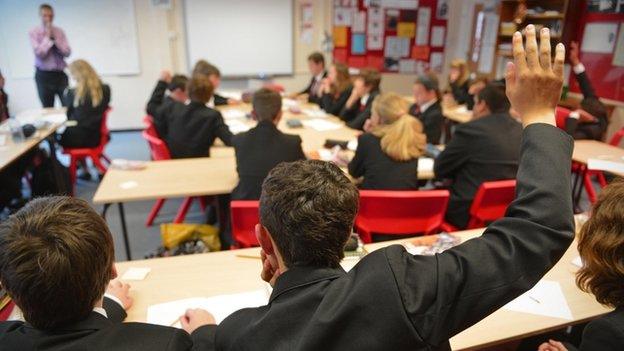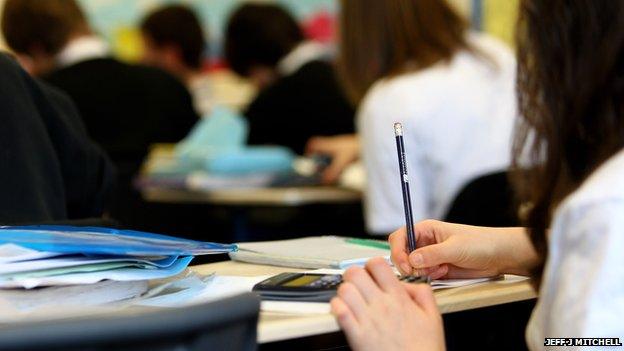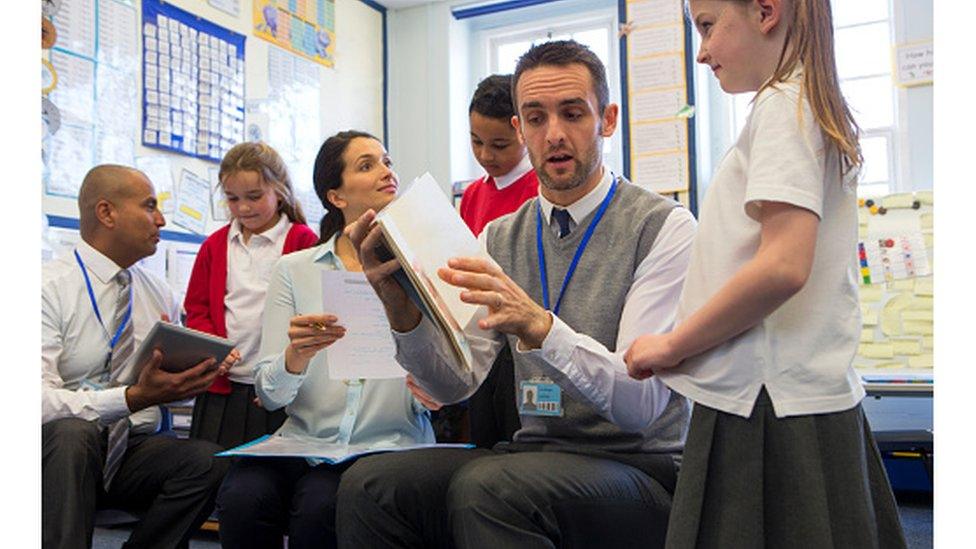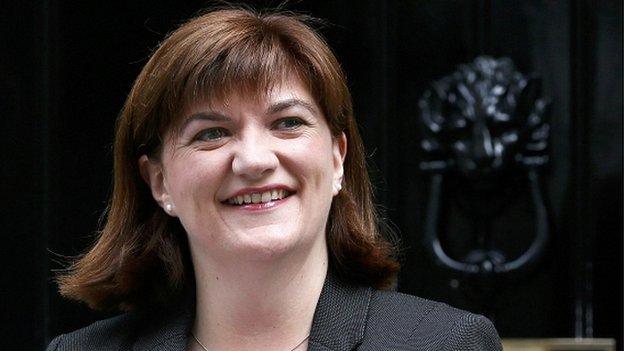All failing schools to be academies under new bill
- Published
- comments

Up to 1,000 more schools could be academies by the next election, say ministers
Up to 1,000 schools in England, including all those rated inadequate by Ofsted, will be turned into academies, the government has announced
The Education and Adoption Bill seeks to "remove bureaucratic and legal loopholes" that slow up the process of turning failing schools into academies.
Education Secretary Nicky Morgan said schools would be improved faster by academy sponsorship under the plans.
Labour said the "divisive" bill missed the challenges faced by schools.
Pupils 'languishing'
The government says campaigners have too often been able to delay or overrule the process by which schools deemed failing become academies.
Ministers believe debates surrounding some attempts to impose academy status result in too many pupils "languishing in underperforming schools".
Under the bill, the regional commissioners would take on the responsibility for making academy orders, and the requirement for potential academy sponsors to consult with the local community would be scrapped.
The bill sets out measures to turn all schools deemed to be failing into academies, doubling the current rate.
Currently, schools are said to be failing if rated inadequate by Ofsted and missing government benchmarks on results and pupil progress, but new yardsticks are to be consulted on in the near future.

What are academies?
Academies are state-funded schools that are independently run by academy trusts or chains - charities that run a string of state schools.
Sponsored academies are schools that have been "taken over" because they were not deemed to be doing well enough under local education authority influence.
Although the schools are still managed in the same way, by a head teacher and the governing body, they are supported by the chain, which may provide a fresh impetus, direction and influence.
This sidestepping of the local authority is seen by some as a form of privatisation, as the trusts are not directly accountable to the local electorate.
Trusts and chains are not allowed to make a profit from running schools, which are inspected by Ofsted in the usual way.

Currently, 235 schools are deemed to be failing, but the government estimates up to 1,000 schools will become academies by 2020, if the bill is passed.
It is not yet clear exactly which other categories of schools will be targeted with this fast-track intervention. There have been suggestions that all schools rated less than good - those rated requiring improvement - could be targeted as well as coasting schools, those with stagnating results.
Over the course of the last Parliament, 1,100 schools became sponsored academies.
Other new measures include:
Duties on local authorities and governors issued with these orders to pursue academy status to a timescale
Coasting schools would be given notice to improve and offered support but could also have their heads replaced or be forced to become academies
The bill will allow the best education experts to intervene "from the first day we spot failure", said Mrs Morgan.
Speaking on Breakfast, Nicky Morgan would not answer a question on how many existing academies are failing
"It will sweep away the bureaucratic and legal loopholes previously exploited by those who put ideological objections above the best interests of children," she said.
Hundreds of schools, often in disadvantaged areas, were already being turned around, "thanks to the help of strong academy sponsors", she said.
"This bill will allow them to do their job faster and more effectively."
'Depressing'
She told the BBC it currently took 13 months on average to turn a school into an academy, and "a day spent in a failing school is a day too long when a child's education is at stake".
Asked how many existing academies were deemed to be failing, Mrs Morgan did not give a number, but said there were "obviously academies that are not rated good or outstanding".
Shadow education secretary Tristram Hunt said Labour had founded the academies programme and continued to support new leadership for failing schools.
"But these measures do not meet the challenges we face in education, such as preventing educational inequality setting in during the early years and ensuring high-quality teachers are attracted into poorly performing areas.
"It is very depressing to see the government's partisan and divisive education policy continuing into this Parliament."
Academy chain leaders welcomed the plan.
Steve Lancashire, chief executive of REAch2, which from September will sponsor 51 schools across England, called it a "very positive step forward for families across the country. It will mean no child is left behind."
'No magic wand'
But Brian Lightman, leader of the Association of School and College Leaders, warned that taking over schools was not always a straightforward solution.
Rapid and effective intervention was needed when a school was rated inadequate, said Mr Lightman. "In many cases academisation may be the best solution. However, in itself it is not a magic wand."

Schools needs investment and support not sanctions and threats, says NAHT leader Russell Hobby
National Association of Head Teachers leader Russell Hobby said the government had once again resorted to "sanctions and threats when our education system desperately needs investment and support".
"Parents who have campaigned against the opaque and centralised process of academisation will be dismayed to see themselves dismissed as obstacles to be eliminated."
And the chairman of the Local Government Association's children and young people board, Councillor David Simmonds, called for "bureaucratic barrier"s which he said had prevented councils from intervening for a long time, "swept away".
He said: "Hundreds of schools, often in disadvantaged areas, are being turned around thanks to the intervention of local councils.
"It's clear that strong leadership, outstanding classroom teaching and effective support staff and governors are the crucial factors in transforming standards in struggling schools.
National Union of Teachers leader Christine Blower called the pledge to convert up to 1,000 schools "as irrational as it is impractical".
- Published7 May 2016

- Published27 May 2015

- Published15 May 2015

- Published13 October 2014
